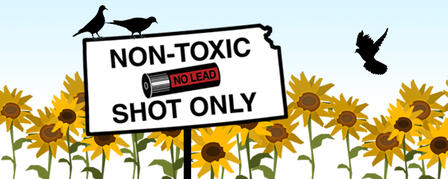SPECIALLY MANAGED FIELDS ATTRACT DOVES AND HUNTERS

August 15, 2013
Designated dove fields on public lands require non-toxic shot
PRATT – On many Kansas Department of Wildlife, Parks and Tourism (KDWPT) public wildlife areas, managers have been working all summer to attract doves. Specific crops have been planted and managed, and if Mother Nature cooperates the dove hunting on these fields can be fantastic.
On many areas, these practices have been followed for several years; however, there are some changes for the 2013 season. The biggest change is that on designated dove fields, hunters will be restricted to non-toxic shot. Dove harvest has been high on many fields, and they draw large number of hunters for the first few days of the dove season. This kind of hunting pressure on small fields results in a large amount of lead shot being concentrated in a small area. Lead is toxic, especially to birds, so the non-toxic regulation has been implemented.
The fields requiring non-toxic shot will be designated with signs, and non-toxic shot is required for all shotgun hunting on these fields as long as the signs are in place. The following wildlife areas may have designated non-toxic shot fields: NORTHWEST – Jamestown WA, Glen Elder WA, Ottawa WA, Smoky Hill WA, and Wilson WA. NORTHEAST – Kansas River WA, Tuttle Creek WA, Clinton WA, Perry WA, Milford WA, Noe WA, and Hillsdale WA. SOUTHCENTRAL – Cheney WA, El Dorado WA, and Marion WA. SOUTHEAST – Dove Flats WA, Elk City WA, Fall River WA, La Cygne WA, Mined Land WA, Spring River WA, Toronto WA, and Woodson WA.
Hunters can see which wildlife areas have managed dove fields by going to www.ksoutdoors.com, clicking on “Hunting,” then “Migratory Birds” and “Doves.” Narratives for each area under the “Managed Dove Hunting Areas On KDWPT Public Lands” heading provide field locations, crop types and any special restrictions in place.
Dove hunting on these specially managed fields can be so good they will attract many hunters. Common courtesy and strict safety procedures must be followed to ensure everyone has a safe and enjoyable hunt. Always keep plenty of space between hunting parties, be conscious of where you are shooting and where your shot will drop, and never take shots at low flying birds.
The 2013 season for mourning, white-winged, Eurasian collared and ringed turtle doves is open Sept. 1-Oct. 31 and Nov. 2-10. The daily bag limit for mourning and white-winged doves, single species or in combination is 15. The possession limit is 45. There is no limit on Eurasian collared and ringed turtle doves, but any taken in addition to a daily bag limit of mourning and white-winged doves must have a fully-feathered wing attached while being transported. A Kansas Harvest Information Program permit is required to hunt doves. An extended exotic dove season for Eurasian and ringed turtle doves will open Nov. 20-Feb. 28, 2014. There is no daily bag limit, but a fully-feathered wing must remain attached while the birds are transported.
-30-









